- Home
- T. Kingfisher
Seventh Bride Page 4
Seventh Bride Read online
Page 4
The anatomy of hedgehogs makes it nearly impossible for one to put its paws on its hips, but it managed a fair approximation.
Rhea tried again. “Are you really a hedgehog?”
It nodded.
“You’re not a fairy, or an enchanted person?”
It shook its head.
“Um.” The little voice in her head yelling about normal hedgehog behavior was starting to get very loud. “You seem very smart for a hedgehog?”
It shrugged.
“I don’t suppose—and I realize this is completely insane—but you don’t talk, do you?”
For having such a small face, the hedgehog could manage quite a large look of disgust. Rhea found that she was rather relieved. Children’s stories aside, there would have been something quite horrible about a talking hedgehog.
She sighed, and rubbed a hand over her face. “I’m sorry. I’m…I have to go along the road. To the house, you know.”
The hedgehog frowned. It waved its front paws across each other and shook its head in a clear warning.
“I know,” Rhea said. “I don’t want to go. I just don’t have any choice.” She could feel a sob lurking in her chest, and squelched it. It’s one thing to cry by yourself, and quite another to cry in front of a stranger, even if the stranger is only a hedgehog.
The hedgehog dropped to all fours and trundled up to the white road, where it stopped. The moonlight caught in its prickles as it gazed up the length of the road.
After a moment, it turned and came back. It sat up again, and held up its paws, like a child asking to be picked up.
“You want me to carry you?”
It nodded.
“Err—you want to come with me? To the house?”
It nodded again.
“Oh. Um. Are you sure?”
It was starting to get impatient. A hedgehog hopping irritably on its hind legs is a tragic sight. Rhea reached down and lifted the animal cautiously in both hands.
The prickles were indeed prickly, but not sharp enough to break the skin. The hedgehog wriggled a bit, settled its spines like a woman arranging its skirts, and nodded to her.
“Are we ready to go, then? Um. Okay.”
She stepped back onto the white road.
It was still white, and it still glowed under the moon, and the cobbles were still as rounded as old skulls, and the leaves still washed like blood across the stones, but Rhea felt better. She was still going somewhere terrible, but she had a hedgehog, damnit.
It wasn’t that having a hedgehog was necessarily going to do any good—she couldn’t think of any stories where wicked wizards had been brought low by hedgehogs, and anyway, she couldn’t even swear that Crevan was a wicked wizard to begin with—but it is somehow easier to face things when someone else is there. Courage still does most of the heavy lifting, but Pride gets its shoulders in there, too, just to keep you from embarrassing yourself in front of the other person.
Leaves crunched under her feet as she walked.
After about twenty minutes, her arms started to get tired.
“Do you suppose I could put you in a pocket?” she asked.
The hedgehog considered this, then nodded. Rhea opened the pocket in her skirt and slipped the hedgehog into it. There was a prickly shifting against her leg, and then the hedgehog got itself straightened out and poked its nose over the top.
They kept walking.
The trees began to close in again. The drifted leaves grew thicker, throwing dark tendrils across the road, and occasionally blowing and tumbling in the wind. The leaves moved like living things, but the noise was dry and dead.
When they blew, it sounded like small creatures skittering along the road.
Rhea’s jaw ached from clenching her teeth. The noises behind her scraped on her nerves. It was like walking through a crowd of mummified mice that stood up and danced behind your back.
The trees were thick enough now that the white road was more of a deep blue and black road, with occasional white spots, the color of an enormous mottled bruise.
They kept walking.
Then the trees stopped. Rhea saw the moonlight in a blue-white wall in front of her, and stepped nervously out into it. To her eyes, which had gotten used to the dark under the trees, the open road blazed like noon.
There was a kind of cleared corridor around the road, with the trees pushed back a good fifty feet on either side. Grass grew along the verge. Weeds spread broad leaves over the ground, or lifted seedheads into the air. It was not well-tended, and yet the plants seemed to be avoiding the white stones.
Over the road was an arch of black wrought iron.
Sitting on top of the arch was a bird.
The hedgehog shifted in her apron pocket, and made a mistrustful snorting noise.
Rhea reached down and brushed the prickles of its head with her fingers. “I don’t like this either,” she whispered.
It huffed a bit, but settled.
The bird looked like a crow, or rather, it looked more like a crow than it looked like anything else. Its beak was serrated like a bread knife, and parts of it gleamed in the moonlight in a way that wasn’t quite normal for feathers.
When Rhea and her passenger were almost to the archway, the bird opened its eyes.
Rhea inhaled sharply. If not for the fact that the hedgehog was watching, it might have been a yelp.
The crow had two round stones for eyes, tied around the middle with cord. The sound of its eyelids sliding over the lumps of cord was a dry scrape, like the sound of the leaves blowing over the road.
It turned its head, sharp and birdlike, and she saw that the strange gleam was from bare skin. The top of its head was bald and leathery, the color of old jerky, and there was pale stitching running from the edges that vanished under the feathers. The feathers themselves were grey and dull and leaked ragged bits of down.
The whole bird looked dead, except for the fact it was moving.
Then it spread its wings, and she gasped.
The wings were crow-like enough, where they beat the air, but down its neck, running the length of the body, was a Y-shaped panel of bare flesh, held together with rough cord.
It took a moment to recognize the shape. Rhea had helped her mother gut chickens before, but the usual way was to go in through the bottom, so that you had a bird you could stuff later. But the other way to do it, if you didn’t care how you were going to cook it afterwards, was to cut it open from the neck on down.
The bird had been dead. And somebody had cut it open and put stone eyes in its head and sewn it back together and notched its beak and made it alive again.
She had a feeling she knew who that had been.
The bird-golem’s serrated beak creaked open, like pinking shears, and a voice came out. From her pocket, the hedgehog hissed.
“Be…bold…”
breathed the thing that wasn’t quite a crow.
That’s easy for it to say, said the voice inside her head sarcastically.
That was fine. If she was paying attention to the voice in her head, she didn’t have to notice how badly her hands were shaking.
“Do you belong to Crevan?” she asked, and was quite surprised at how strong her voice sounded. There was hoarseness down in its depths, but it did not tremble.
The serrated beak creaked open.
“Be…bold…”
it said again.
“You said that already,” she muttered. The bird-golem cocked its head, and then, very slowly, the eyelids slid down over the stone eyes again.
She wondered if it could fly at all.
“Be bold, be bold…” she said to herself. What kind of advice was that? Is advice from an animate thing made of cords and stones and dead crow to be trusted anyway?
The hedgehog shifted impatiently in her pocket. She squared her shoulders and walked through the arch.
The back of her neck prickled. She almost expected the bird-golem to strike at her, but nothing happened.
She was a dozen
steps along, and she turned and looked back at the iron arch. The golem was hunched and dark and looked like nothing alive, as if the maker of the arch had included some irregular bit of decoration that hadn’t quite worked out.
They kept walking.
The wind died. It seemed along this stretch that neither wind nor rain had troubled the road for some time. White dust had filled up the spaces between the cobblestones. It puffed up with every step and hung drifting in the air. When Rhea glanced over her shoulder, her footsteps seemed to smoke behind her.
She could see something in the distance. The hedgehog, who had tucked down into her pocket, shifted, and its pointed face peered over the pocket’s edge again.
It was another arch. There were two more dark lumps on it, huddled together at one end, as if for warmth.
Two sets of cord-wrapped stones opened and watched Rhea’s approach. The hedgehog huffed its annoyance from her pocket.
The one on the left flapped its wings. It had the Y-shaped cut down its belly, but most of its head still had feathers on it. The serrated beak creaked open.
“Be bold…be bold…”
The second bird-golem had only one leg. The other ended in a stump wrapped with wire. The wire glittered in the moonlight, and made a thin metallic clink against the iron of the arch. The second bird opened its beak and breathed:
“…but not too bold…”
The hedgehog hissed.
Rhea found that in addition to being terrified and upset, she was now also rather annoyed. This was stupid. Be bold, but not too bold? Too bold about what? Where was she supposed to be bold?
Some specifics would have been nice. Be bold for the next fifty steps, then not too bold for the next hundred, say.
“That’s not very helpful,” she told them.
The bird-golems folded up their wings and lapsed back into silence.
She stalked under the arch and down the white road. When she kicked at the stones, the white dust roiled up nearly to her knees, and the hedgehog gave an indignant sneeze from her pocket.
“Sorry,” she muttered. “But if you’re going to go to all the trouble of setting up dead birds on the road to deliver messages, they should at least say something useful.”
The annoyance was helpful. It pushed back the fear, and made a clear space in her head where she could think. If she concentrated on the stupidity of re-animating a bird just so that it could deliver a message that didn’t make very much sense, she wasn’t thinking about what lay at the end of the white road.
She was so determinedly not thinking about the end of the road, in fact, that it came as a shock when she looked up and it was there.
The road swept up to a high black arch, and on the other side, it opened into a broad white courtyard. A fountain stood in the center, the water glittering so silver in the moonlight that it seemed like it should chime like coins when it fell into the basin. The house on the other side was a huge crouching darkness under the trees.
That is not a hunting lodge.
It was a manor.
It was not possible that there was a manor house of this size anywhere near the village. Everyone would know about it. It was bigger than the Viscount’s manor. You couldn’t just hide it off in the woods somewhere.
And yet there it was.
On the black iron arch, there were three birds. Two sat tightly together, their wings around each other. The third bird sat alone, on the other side of the arch, pointedly not looking at the other two.
Rhea felt her heart quailing at the sight of the dark house, but she shoved it back. She stomped up to the arch and glared at the golems.
“Well?”
The two on the left looked down at her. The third bird did not.
“Be bold…be bold…
But not too bold…”
whispered the birds on the left, and bent their heads down against each other’s stitched breasts as if in some terrible sorrow.
The third bird-golem had almost no feathers left, its body hard and waxy-looking in the moonlight. The wings looked like a net of wires with a few tattered primaries stuck in it.
Without looking at her, its beak creaked open, and it said,
“…or your heart’s blood shall run cold.”
“Well, that rhymed at least,” Rhea snapped, “but it still isn’t very useful advice!”
The hedgehog was shaking a tiny paw at the bird and snorting angrily, which fed her courage. She put her hands on her hips. “Is that the best you’ve got?”
The bird-golem’s head snapped around suddenly, and it rocked forward. Rhea jerked back as the golem crawled over the arch, using its wire wings like claws. The hedgehog hissed, but the creature ignored it, hanging from the metal of the arch and thrusting its beak towards her face.
She was less than a foot from the bird-golem’s face. She could see a fine hairy haze lying over the whole thing, made of old bits of down and dust and grit.
The beak opened. Its tongue was a small dry nub like a blackened nut.
“…this…is a murderer’s…house…”
whispered the dead bird.
Rhea stumbled backward. Her foot turned on one of the round stones, and she sat down, hard. In her pocket, the hedgehog squeaked in alarm.
The thing to do at this point, she knew, the sane and sensible thing, would be to get up and turn around and run down the white road until she was home.
She didn’t, for a couple of reasons.
The first one was that nothing had actually changed. Peasants still didn’t disobey nobles, and if she came back to her family with a demented story about sewn-up dead birds with stone eyes talking…well, they might believe her, but then again, they might not. And she would have failed to turn up at the appointed time, and Lord Crevan did not seem like a particularly forgiving man.
The second reason was that the whole situation was just wrong.
It didn’t make any sense.
Crevan had gone to all the trouble of setting up a half-dozen bird-golems to guard the entrance to his house, and given them a bit of rhyming doggerel to memorize, presumably to warn off intruders. Certainly they would have been quite effective against traveling salesmen. But he’d invited her here—ordered her, if she were being honest—and it made no sense to invite her here, just to warn her off with his creepy dead birds.
Either he was mad—or stupid—or this was some kind of test.
Rhea was quite sure he wasn’t stupid. He had handled her father much too efficiently for that.
He didn’t strike her as mad, either. Young Brad, the wheelwright’s son, had been a bit of a fool and walked through a fairy ring one night, and when the fairies threw him back a week later (Rhea suspected they’d found him as boring as everyone else did), he was as mad as the mist and moonlight. He spent most of his time dancing very slowly in the middle of the road, and was generally harmless. Occasionally he’d take it in his head to put his trousers on the pig, much to the annoyance of both his mother and the pig.
Lord Crevan was not mad, as she understood it. He had probably never put trousers on a pig in his life.
That left the possibility that he was testing her.
Perhaps he was trying to see if she was brave.
“On the other hand,” she said to the hedgehog, “this could be a test to see if I’m sensible, since the sensible thing to do is probably to go home.”
What was the worst that could happen? If she turned and fled, maybe he wouldn’t marry her. That wouldn’t be so bad.
If you were a murderer, would you really guard your home with birds saying, “Hi, I’m a murderer!” though? It seemed a little unsubtle. But would anyone believe you?
No, they wouldn’t. That’s the beauty of it.
You probably could say, “I’m a murderer!”, and get just as many houseguests. People wouldn’t believe you’d admit a thing like that. They’d think you were joking. Rhea didn’t quite believe it herself.
She sighed, and ran a hand through her hair. U
p on the arch, the bird golem had resumed its post, stone eyes gazing into the distance.
“Do you think I should go on?” she asked the hedgehog, who had climbed out of her pocket to sit on her knee.
The hedgehog nodded, then shook its head, then lifted its front paws in the air and let them drop.
I don’t know why I’m second-guessing Crevan’s sanity—I’m sitting here talking to a hedgehog mime.
“You don’t know? The answer’s complicated?” she guessed.
It nodded.
“Should I go to the house?”
It shifted from foot to foot, and looked over its shoulder at the house. Then it nodded, although not with much enthusiasm.
“Is there some reason I shouldn’t go back?” she tried.
The hedgehog nodded violently, and rippled its quills with a shudder.
“Something bad will happen if I go back.” (More nodding.)
“But it won’t happen if I keep going.” (A shrug.)
“Will something bad happen if I go forward?” (Another shrug.)
Rhea rubbed her forehead. She was getting a serious headache. “Is whatever will happen if I go back worse than whatever will happen if I go forward?” (A definite nod.)
You do realize you’re listening to a hedgehog, the voice in her head said. Just thought I’d mention that.
“How do you know this?” she asked
It tapped its nose and spread its paws.
“Too complicated a question, sorry.” This was worse than when the girls tried to tell the future by throwing pinecones in the fire and watching how they fizzled and popped. You couldn’t get much more than “yes” or “no” out of the pinecones—and even that required some imagination—but the questions were at least frivolous ones like “Will I marry a rich man?” not “Am I about to be horribly murdered?”
“Am I about to be horribly murdered?”

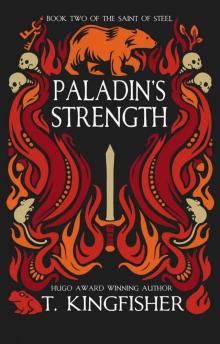 Paladin's Strength
Paladin's Strength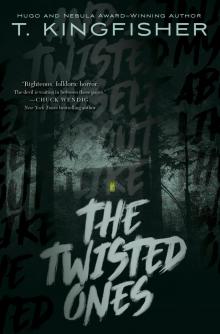 The Twisted Ones
The Twisted Ones The Hollow Places
The Hollow Places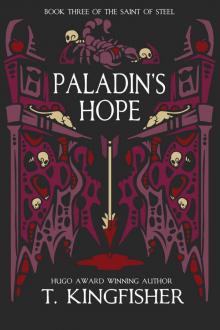 Paladin’s Hope: Book Three of the Saint of Steel
Paladin’s Hope: Book Three of the Saint of Steel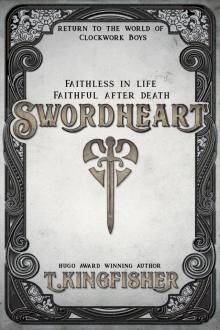 Swordheart
Swordheart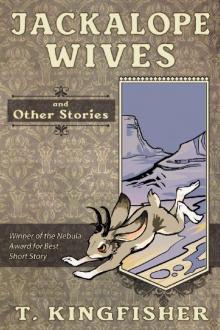 Jackalope Wives And Other Stories
Jackalope Wives And Other Stories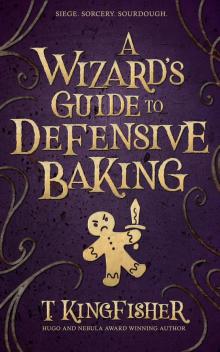 A Wizard's Guide to Defensive Baking
A Wizard's Guide to Defensive Baking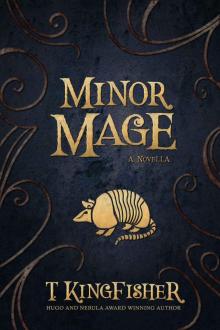 Minor Mage
Minor Mage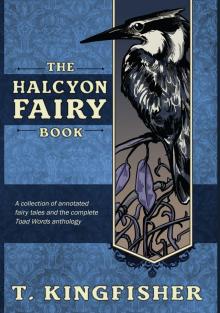 The Halcyon Fairy Book
The Halcyon Fairy Book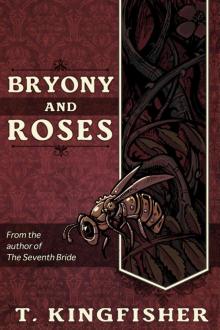 Bryony and Roses
Bryony and Roses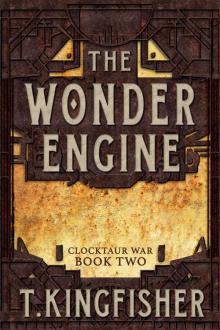 The Wonder Engine_Book Two of the Clocktaur War
The Wonder Engine_Book Two of the Clocktaur War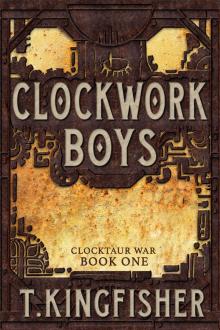 Clockwork Boys: Book One of the Clocktaur War
Clockwork Boys: Book One of the Clocktaur War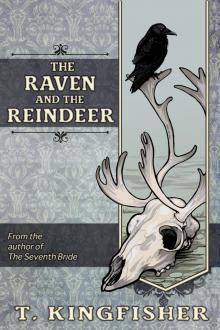 The Raven and the Reindeer
The Raven and the Reindeer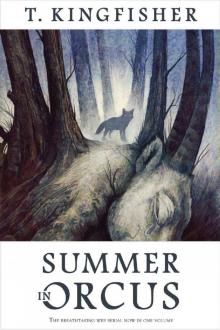 Summer in Orcus
Summer in Orcus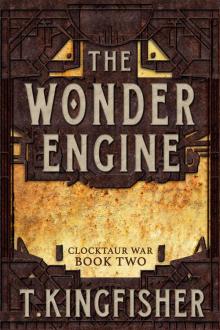 The Wonder Engine
The Wonder Engine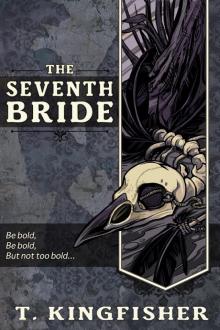 Seventh Bride
Seventh Bride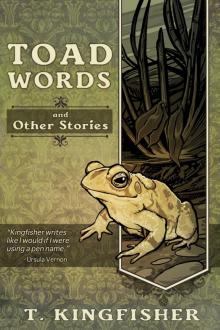 Toad Words
Toad Words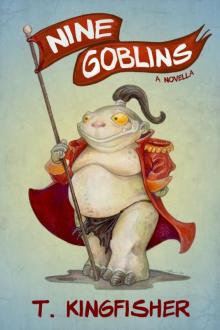 Nine Goblins
Nine Goblins